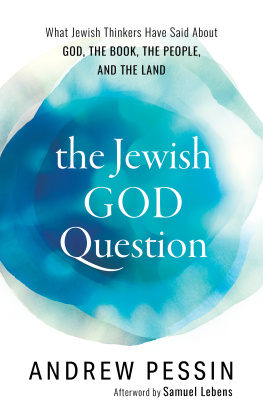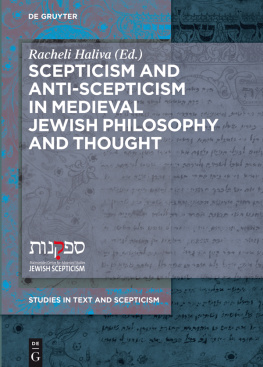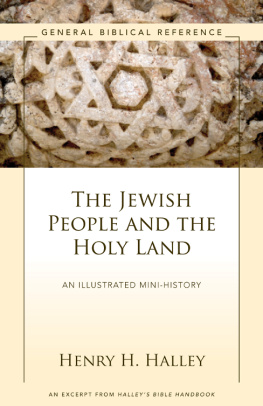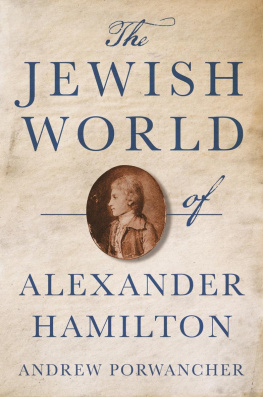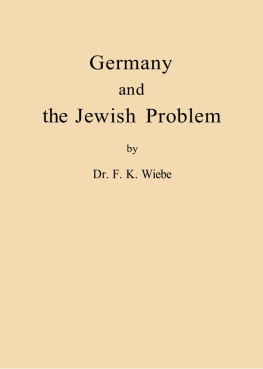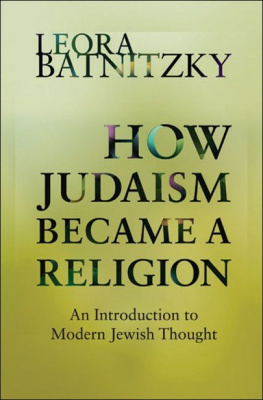Andrew Pessin - The Jewish God Question: What Jewish Thinkers Have Said about God, the Book, the People, and the Land
Here you can read online Andrew Pessin - The Jewish God Question: What Jewish Thinkers Have Said about God, the Book, the People, and the Land full text of the book (entire story) in english for free. Download pdf and epub, get meaning, cover and reviews about this ebook. year: 2018, publisher: Rowman & Littlefield Publishers, genre: Religion. Description of the work, (preface) as well as reviews are available. Best literature library LitArk.com created for fans of good reading and offers a wide selection of genres:
Romance novel
Science fiction
Adventure
Detective
Science
History
Home and family
Prose
Art
Politics
Computer
Non-fiction
Religion
Business
Children
Humor
Choose a favorite category and find really read worthwhile books. Enjoy immersion in the world of imagination, feel the emotions of the characters or learn something new for yourself, make an fascinating discovery.
- Book:The Jewish God Question: What Jewish Thinkers Have Said about God, the Book, the People, and the Land
- Author:
- Publisher:Rowman & Littlefield Publishers
- Genre:
- Year:2018
- Rating:4 / 5
- Favourites:Add to favourites
- Your mark:
- 80
- 1
- 2
- 3
- 4
- 5
The Jewish God Question: What Jewish Thinkers Have Said about God, the Book, the People, and the Land: summary, description and annotation
We offer to read an annotation, description, summary or preface (depends on what the author of the book "The Jewish God Question: What Jewish Thinkers Have Said about God, the Book, the People, and the Land" wrote himself). If you haven't found the necessary information about the book — write in the comments, we will try to find it.
Andrew Pessin: author's other books
Who wrote The Jewish God Question: What Jewish Thinkers Have Said about God, the Book, the People, and the Land? Find out the surname, the name of the author of the book and a list of all author's works by series.
The Jewish God Question: What Jewish Thinkers Have Said about God, the Book, the People, and the Land — read online for free the complete book (whole text) full work
Below is the text of the book, divided by pages. System saving the place of the last page read, allows you to conveniently read the book "The Jewish God Question: What Jewish Thinkers Have Said about God, the Book, the People, and the Land" online for free, without having to search again every time where you left off. Put a bookmark, and you can go to the page where you finished reading at any time.
Font size:
Interval:
Bookmark:
The Jewish God Question
The Jewish God Question
What Jewish Thinkers Have Said about God, the Book, the People, and the Land
Andrew Pessin
Rowman & Littlefield
Lanham Boulder New York London
Published by Rowman & Littlefield
An imprint of The Rowman & Littlefield Publishing Group, Inc.
4501 Forbes Boulevard, Suite 200, Lanham, Maryland 20706
www.rowman.com
Unit A, Whitacre Mews, 26-34 Stannary Street, London SE11 4AB, United Kingdom
Copyright 2018 by The Rowman & Littlefield Publishing Group, Inc.
Chapters 3, 4, 1618, 43, 67, and 80 are adapted from Andrew Pessin, The God Question: What Famous Thinkers from Plato to Dawkins Have Said about the Divine (London: Oneworld, 2009) and are used here by permission.
All rights reserved . No part of this book may be reproduced in any form or by any electronic or mechanical means, including information storage and retrieval systems, without written permission from the publisher, except by a reviewer who may quote passages in a review.
British Library Cataloguing in Publication Information Available
Library of Congress Cataloging-in-Publication Data
Names: Pessin, Andrew, 1962 author.
Title: The Jewish God question : what Jewish thinkers have said about God, the Book, the People, and the Land / Andrew Pessin.
Description: Lanham, Maryland : Rowman & Littlefield, [2018] | Includes bibliographical references and index.
Identifiers: LCCN 2018012999 (print) | LCCN 2018013071 (ebook) | ISBN 9781538110997 (ebook) | ISBN 9781538110980 (hardcover : alk. paper)
Subjects: LCSH: Jewish philosophyHistory. | GodJudaismPhilosophy. | Bible. Old TestamentPhilosophy. | JudaismPhilosophy.
Classification: LCC B755 (ebook) | LCC B755 .P47 2018 (print) | DDC 296.3/11dc23
LC record available at https://lccn.loc.gov/2018012999
 The paper used in this publication meets the minimum requirements of American National Standard for Information SciencesPermanence of Paper for Printed Library Materials, ANSI/NISO Z39.48-1992.
The paper used in this publication meets the minimum requirements of American National Standard for Information SciencesPermanence of Paper for Printed Library Materials, ANSI/NISO Z39.48-1992.
Printed in the United States of America
Acknowledgments
Much of the research for this book was supported by a grant from the Academic Engagement Network (AEN), to whom I give much thanks. Their support of this work also contributed to the establishment of a Jewish Studies minor at Connecticut College, for which I give additional thanks. I also thank Sharon Portnoff, Shai Afsai, Paul Nahme, Rabbi Barry Dolinger, and Samuel Lebens for looking over portions of the book to catch potential errors. (If any remain it is entirely their fault.)
Introduction
Consider the many meanings of the word Israel.
It starts as the name of a person. The biblical patriarch Jacob is given this new name after a night spent wrestling with an angel sent from God (Genesis 32:29). Jacobs sons and daughter subsequently become the children of Israel, then multiply into the tribes of Israel, who, collectively, as a people, are often simply called Israel. The land (1) in which they first arose as a people, (2) which the Bible apportions between the tribes, (3) where they first obtained political sovereignty three millennia ago, and (4) where they primarily dwelled for the next millennium is called the Land of Israelthat is, the land of the people Israel, or simply Israel. And of course the modern state founded in 1948 took as its official name the State of Israelagain, the state of the people Israel, or simply Israel for short.
And what does the word Israel mean in the first place? The Hebrew Bible tells us, Your name shall no longer be Jacob, but Israel, for you have striven with beings divine (Genesis 32:29). In Hebrew, in other words, the name essentially means one who struggles with, contends with, prevails over the divine.
So, Israel refers to a person, a people, a land, and a stateand to struggling with (and maybe even prevailing over?) God, the way that Judaism, the religion of Israel, long has.
Welcome to the Jewish God Question.
Or, more accurately, the Jewish God Question s , for there are many that fall under this heading.
As long as there have been Jews, there have been Jewish thinkersand they have been thinking about the many things referred to as Israel and all their connections. Who are the biblical patriarchs and matriarchs, and what is the precise nature of the people, the land? Who or what is God, and can His existence be proven? What is His relationship to the progenitors, the people, the land? What does God demand of the people, the Jews, and why? Why were they expelled from the land with the destruction of the Second Temple (70 CE)? Why have they been kept in exile, in dispersion, for so many long centuries? How should they relate to the broader communities in which they live? Does God still demand of them today what He demanded of them back on Mount Sinai, even in their condition of exile? And why them , of all people?
Starting in the seventeenth century, as the modern era arrives, the Jewish God Question, with all its many components, takes on new and sharper forms reflecting the surrounding Western cultures. What role should religion play in public life in general, if any? Should religion be discarded in favor of a life of reason, of enlightenment? Is it feasible to believe in God in the modern world? Can a Jew even fit into the broader society in which he or she has lived, and remain a Jew ? Can (or should) one separate the Jewish person from the Jewish religion? Can (or should) one separate the Jewish people from the Land of Israel? Should Jews simply disappear as a collective bodyconvert, intermarry, assimilate, vanish? Or should they return to their ancient homeland and reestablish their long-lost political sovereignty? What does the Jewish religion say about all this? Or should we not even pay attention to it?
If one thing is clear, as suggested by all these questions, it is this: Jews have been continuously struggling with God, and everything that that struggle entails, ever since that fateful encounter between Jacob and the angel.
This book will introduce you to some of the things Jewish thinkers have said about these matters, and more. The goal is not to be comprehensive, because that is not possible. It is, rather, to sample some of the more interesting, counterintuitive, provocative things famous thinkers have had to say, as well as to introduce you to some thinkers you probably havent heard of. Youll also notice that there is plenty of disagreement among the thinkers here. Theres the famous expression, Ask two Jews, get three opinions. This phenomenon is perhaps grounded in the great tradition of disagreement and debate represented by the ancient Talmud, which remains a central object of study for Orthodox (and many non-Orthodox) Jews to this day. This vast document records for posterity disputes on matters large and small, recognizing that where truth is the goal, These and those are [both] the words of the living God (Talmud Tractate Eruvin 13b). Truth can be difficult to discern, in other words, and all sides sincerely seeking it have something to contribute. No one ever said that struggling with God should be easy or straightforward.
The phenomenon is also grounded in another fact: The Jews are often divided among and against themselves. Jacobs sons did not always get along very wellthey sold Joseph into slavery, rememberand the tribes that descended from them followed suit. The pattern continued through their long millennium dwelling in the Land of Israel, and then through the centuries of dispersion and exile. It only grew more intense in the modern era, when the possibility of seriously transforming, and even leaving, the Jewish religion became a live one; and all the more so with the rise of political Zionism, which really forced on many Jews the problem of deciding just who or what they and their Jewishness were and should be. The divisiveness remains in full force today, both inside and outside the State of Israel, as Jews within and without struggle not only with God, but also among themselves with respect to who or what they, and their collective, is and should be.
Next pageFont size:
Interval:
Bookmark:
Similar books «The Jewish God Question: What Jewish Thinkers Have Said about God, the Book, the People, and the Land»
Look at similar books to The Jewish God Question: What Jewish Thinkers Have Said about God, the Book, the People, and the Land. We have selected literature similar in name and meaning in the hope of providing readers with more options to find new, interesting, not yet read works.
Discussion, reviews of the book The Jewish God Question: What Jewish Thinkers Have Said about God, the Book, the People, and the Land and just readers' own opinions. Leave your comments, write what you think about the work, its meaning or the main characters. Specify what exactly you liked and what you didn't like, and why you think so.

